|
|
|
|
Irkutsk city - the Wooden Capital of Eastern Siberia
|
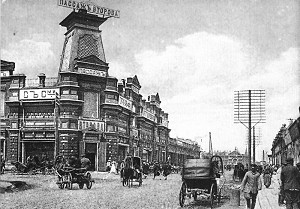 |
|
Irkutsk is an unique old city, the ancient crossroads of trade routes, the capital of Eastern Siberia.
Proximity of sacred lake Baikal, the Angara and the Irkut rivers determines the soul of the city and its
people: calm, kind, patient and generous.
Irkutsk was founded as a wooden fort in 1661 on the right bank of the Angara, declared a city in 1686 and
nominated the center of Irkutsk province in 1764.
Modern Irkutsk is a historical city, which combines magnificence and unique nature of a historical center
with blocks of modern buildings, traditions of the most intelligent and educated Siberian city with modern
industrial, research and educational potential.
Even today, Irkutsk still remains at crossroads of transportation routes, which bind the West and the East
of Russia and connect Russia with China and Mongolia. |
Transsiberian railway and federal road Moscow - Vladivostok run through Irkutsk.
International airport of Irkutsk is an important intermediate landing for airlines connecting airports of
South-East Asia and Far East with European part of Russia and countries of former USSR. Over its history,
Irkutsk square area grew to now occupy 28 thousand hectares. Population of Irkutsk amounts to nearly 600
thousand people. Average age of Irkutsk residents is 36 years old.
Trademark «Irkutsk»
Irkutsk has in the area of sixty large and medium-sized industrial enterprises, which operate in mineral
mining, power generation and distribution, gas and water production, processing industry. Most of
industrial production is done in manufacturing of electronic and electric equipment, commutation
equipment, vehicles, metallurgical and rock-mining equipment.
Over one half of total amount of produced goods is exported to various countries of the world.
Products of Irkutsk aircraft construction plant — a branch of «Corporation Irkut» — multifunctional
aircrafts (Sukhoy-30MK, Be-200), as well as products of Irkutsk plant of heavy machinery building,
which include goldmining, metallurgical and rock-mining equipment, are supplied to Russian companies,
as well as abroad to Kazakhstan, Ukraine, India. Pakistan, Turkey, Iran, Egypt, Algeria, Burma and
other countries. Wide range of products of «Relay Plant» are applied in automation equipment in railway
transport, in aircraft and automobile industries, and in household appliances.
"Irkutsk Fat-And-Oil Integrated Plant» is one Russia's leaders, and a definite leader of Siberia and
Far East in production of fat-and-oil products, soy flour, oilseed meals for cattle. Residents of
Irkutsk and city guests trust a wide range of products offered by «Irkutsk Bakery Plant», OAO «Irkutskiy
Meat-Packing Plants and «Irkutsk Butter and Cheese Plant».
Power Generation:
Irkutsk indeed deserves the right to be called one of Russia's largest power generation centers. Irkutsk
hydroelectric power generation plant is located within the city's bounds providing 660 MW of power.
Novoirkutskaya heat-and-power generation plant only yields a fraction producing 655 MW of power. Net
annual electric power generation by these two plants is in excess of 6 billion kWh. Both of the enterprises
are part of «Irkutskenergo», which also includes the following hydro and heat electric power generation
facilities: 3 hydroelectric power generation stations, 9 heat-and-power generation plants, electric and
heat transmission networks.
«Irkutskenergo» holds the second place in Russia in terms of heat production and the third place in
electric power generation. Thanks to having a set of hydroelectric power stations on the Angara river,
the price of energy produced in Irkutsk is much lower than that produced by nuclear power plants.
Consumer Market:
Irkutsk is a large trade center of East Siberia. It concentrates over 470 thou. m2 of high quality retail
trade space, which employs over 70 thousand residents of the city. Also, there are 32 retail markets, the
largest of which are «Noviy» market and municipal central market». Annual turnover of retail trade in 2007
amounted to about 67 billion rubles, or at least 115.04 thousand rubles per capita of Irkutsk population.
Goods worth 182 million rubles are sold daily in the city. Chain stores with high level of service and quality
of foods are well developed in the city. Each resident of Irkutsk is likely to know the locations of chain
supermarkets: «Slata», «Bagira», «Caesar», as well as a network of own outlet stores of Irkutsk fat-and-oil
plant and Irkutsk meat packing plant. Now the people of Irkutsk know the benefits of having a food store
within a walking distance from home, or, as they say — right next to your door. It will cause you no trouble
to buy manufactured goods of various price levels to match any taste in Irkutsk, Products of local producers
enjoy well-earned demand of Irkutsk residents. Quality of goods produced by foods and processing industry
enterprises of the city has been awarded with the most prestigious ranks both within the region and beyond.
People of Irkutsk and its visitors can have a lovely meal in any of over 899 public catering establishments
with total of 33000 seats representing different cuisines of virtually all countries of the world. Turnover
of catering industry in Irkutsk over 2007 amounted to 2,4 billion rubles. Some of the catering chains popular
among Irkutsk residents include: «Pizza-Domino», «Mamochka», «Pizza-Pinocchio», «Chudo-Bludo», «Podsolnukh»,
«U Juzeppe», «Twelve months» etc.
Irkutsk has a wide range of enterprises providing consumer services, with total number of 1053 such facilities.
These employ about 6000 people. Turnover of services in 2007 amounted to over 1.7 billion rubles or 3011 rubles
per capita of Irkutsk population. Widely spread are the following consumer services: clothes and shoes repair,
repair of household appliances and video equipment, dry cleaning, hairdressing salons and other types of
consumer services in a wide range.
|
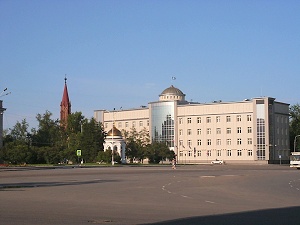 |
|
Irkutsk International position:
Irkutsk has always been and will remain an attraction for tourists and travelers, businessmen or simply
those curious of the city. The key reason for that is being close to lake Baikal, and also that the city
lies between the East and the West not just geographically, but also in its soul. Twin cities of Irkutsk
are the cities of Kanazawa (Japan), Ulan-Bataar (Mongolia), Eugene (USA), Shengyang (China).
Irkutsk is also engaged into active cooperation with the following foreign partner cities:
Pforzheim (Germany), department of Upper Savoya - cities of Evian, La Roche, Tonon-Le-Ben, Ansie (France),
commune Stremsund (Sweden), Province of Pordenone (Italy), city of Simpheropol (Ukraine). Bilateral
cooperation has been established between our city and foreign twin cities. This resulted in a |
number project in various domains, traditions of exchange with official
delegations, groups of schoolchildren, students, teachers and doctors, sportsmen and artists.
Irkutsk has diplomatic representatives of foreign countries, such as General consulates of Mongolia,
Poland, China and the Honorable consul of Lithuania republic. Trade and commerce chamber of East Siberia
has been used as basis to open Japan's information center of Japan's general consulate in Khabarovsk.
In addition, Irkutsk has representative office of Russia's Ministry of foreign affairs.
Irkutsk Architecture
A newcomer to Irkutsk immediately falls under impression of its historic memory, which is primarily
imprinted into the city's architecture. Our city is the home for the old and the new, the historical
and the modern, the provincial and capital-like. In today's Russia, this city belongs to museum-cities
because it was able to preserve the romantic appearance of relaxed and careful construction and
radiance of golden domes above the blue Angara.
|
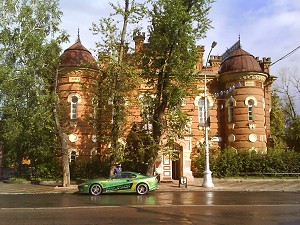 |
|
The first industrial enterprise in Irkutsk was a brick factory. But before it was put into operation, Irkutsk
was a town of log structures. The fire in 1879 destroyed nearly 80% of the central part of Irkutsk. However,
the town was rebuilt quickly and its recovery was aided by the construction of the Trans-Siberian Railway
in 1898. The city ancient center is spread along the right bank of the river. It still contains many wooden
houses. In Irkutsk there are 685 historical and cultural monuments, 108 have federal status.
In terms of the number of churches, Irkutsk is distinguished from other cities of Siberia and Far East.
By 1917, Irkutsk had 2 cathedrals, 3 monasteries and convents with their own churches, 22 parish churches,
28 churches in institutions: schools, hospitals and military regiments, 9 chapels. Most of these were
destroyed during the Soviet epoch; however, fortunately, far from all of the churches suffered this fate. |
For instance, Irkutsk may be proud of all-Siberia famous Spasskaya church, which was built as early as 1706.
Bogoyavlenskiy (Epiphany) cathedral was built in 1718 and is still functioning. The territory of
Znamenskiy (Omen) monastery, which is also the residence of bishop of Irkutsk and Angarsk, is the burial
ground for prominent statesmen of Siberia: the first founder of Siberian lands Grigoriy Shelekhov, wife of
Trubetskoy Decembrist - Ekaterina, first bishop of Irkutsk - sanctifier Innokentiy. Kharlampievskaya church,
which is located in the very center of the city, is now being restored. This is the church, where Admiral
Kolchak, the supreme ruler of Siberia, had his wedding.
|
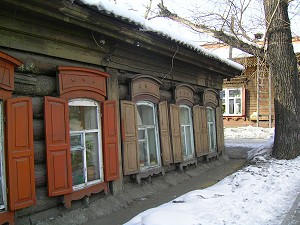
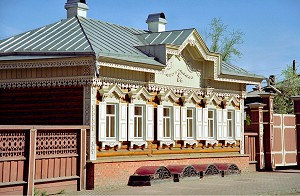
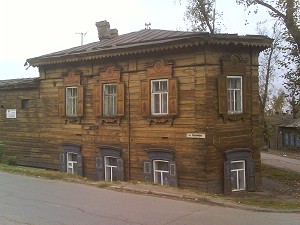
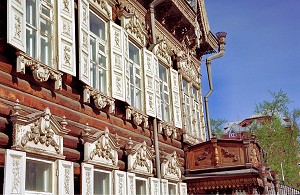 |
|
Wooden Irkutsk
Irkutsk is famous for it’s wooden architecture. It has has preserved many of monuments including ancient
log structures. Some of the log structures have presently been restored. Almost all of the wooden houses
are privately owned. Siberian wooden houses of course differ from the log structures of the European
Russia.
The art of constructing wooden houses in this part of Russia passed through 3 well marked stages:
The 1st stage was the shortest. It was represented by the houses of the first settlers of the city.
Unfortunately, none of this houses remain. Obviously, they were very simple structures - huts. Siberian
huts were huge brown structures. They all had basements which were used to store provisions. The basement
is the most characteristic feature of Siberian houses.
The 2nd stage came in the middle of the 18th century. During this time the house was modified. The
basement was turned into a kitchen of living space, a front porch and balcony appeared and the windows were
widened.
The 3rd stage began in the first half of the 19th century. Simple structures gave way to more
complicated and interesting construction. These houses had different porches and attics. The facades were
decorated with carvings and thread work. Special emphases were placed on adorning windows, with rich carvings
and scrolls. The windows were similar to the windows of a palace in a Russian fairy-tale. The ornaments were
not only decorative, but also symbolic. The symbols depicted different hopes, and dreams of the people of that
time. For example - people believed that evil spirits could enter the dwelling through doors and windows frames.
So the decorations used in those parts of the house were for protection. The sign of the sun could be outlined
with jagged star shapes. It is obvious that this symbolizes life, happiness, and the beginning of all good
things. Also 2 pigeons with a bunch in their beaks are symbolic of a "Universe tree". Long ago, people believed
that in the heavenly paradise there was a fairy tree covering all of heaven with leaves and fruits of all the
trees and plants from all over the world. In this tree these pigeons lived.
All wooden houses can be divided into 3 large groups:
- 1st - those constructed from specially published pattens during the end of 18th through the
beginning of 19th century.
- 2nd - houses of individual projects made up by the local masters.
- 3rd - the most common type in Irkutsk with a basement, a high porch and a balcony on the back side
of the house.
Usually, five or six windows face the street. The windows are rather big. The house is richly decorated with
serous mostly of the Baroque style which was popular at that time. Sculpturesque shutters are painted in blue
and green. Blue and green are 2 favorite colors in Siberia. Blue is a symbol of hope and green is for long
life and youth. White is symbolic of purification.
In Siberia, wooden houses are built in pine and cedar. Sometimes the foundation is of larch because it is
firm and when put under water became as strong as iron. The upper part is constructed our of pine, because
it helps to retain heat inside the house. Until the end of the last century, the interior of wooden houses
was made out of clean logs.
|
The Crossroads of all routes:
As early as in mid-last century, Irkutsk justified itself to be the largest transportation hub of
East Siberia. The city accommodates headquarters of East-Siberian railways, East-Siberian interregional
territorial air transportation, East-Siberian inland navigation company.
Currently, East-Siberian railways are considered to be one of Russia's largest in terms of both
economic performance and technical level. Its cargo transporting intensity is 1.8 times greater
than Russia's railways average.
|
 |
|
Irkutsk airport - the largest airport of East Siberia. At the end of 1954, Irkutsk airport acquired
international status. Favorable geographic location in the center of the Asian part of Russia allows
this transportation enterprise to become an important landing for airlines connecting airports of
South-East Asia and Far East with the European part of Russia and countries of former USSR. As of the
moment, Irkutsk airport has direct flights to 25 large cities of Russia, former USSR countries and a
number of South-East Asian countries. International flights are made to Mongolia, China, Japan, South
Korea, as well as to countries of former USSR and charter flights to Turkey, Thailand and other
countries of the world. On December 26, 2007, Irkutsk airport welcomed its millionth passenger.
"East-Siberian inland navigation company" is the largest navigation company in the region. Over the
time of 120 years, East-Siberian inland navigation company has been carrying |
out cargo and passenger
transportation over lake Baikal, the Angara river, Bratsk and Ust-Ilimsk reservoirs. Currently, this
navigation company possesses the entire required infrastructure to provide high quality services: the
most powerful inland fleet in East-Siberia and own vessel repair enterprises, a well developed network
of branches, which coordinate transportation in various directions.
Over 2007, East-Siberian inland navigation company transported 207 thousand passengers. This number is
expected to increase by up to 5—10% in 2008 to reach 230 thousand passengers.
Preservation of environment-friendly transport should be viewed as a big merit of the city's administration.
At present, the fleet of municipal passenger transportation enterprises of the city includes 64 electric
buses and 58 trams. Also, there is a municipal fleet of buses — total of 200 buses, which service nine
most intense transportation routes. In summer period, the city's bus fleet also services 26 additional
routes to horticultural locations, whose total length is 500 km.
A Student and Youth Center:
Irkutsk is a student and youth center, which hosts 23 higher education institutions and branches providing
education to over 1000 thousand students. Specialists with higher professional education are trained in 29
groups of majors.
At present, Irkutsk hosts 36 successfully operating professional schools, which train 24.4 thousand persons,
including 28 state-funded professional schools.
The system of elementary professional training institutions in Irkutsk comprises 9 institutions, including
4 professional lyceums and 5 vocational schools, which train 5.3 thousand persons in 76 areas. There are
institutions to address elementary professional education needs for handicapped children, orphan children
and deviant behavior children.
The first higher education institution of East Siberia - Irkutsk state university - was founded in 1918.
Irkutsk state technical university is one of Russia's Ministry of education and research, Baikal state
university of economics and law is in top 5 economic universities of Russia.
284 secondary schools of Irkutsk provide secondary education to 86.5 thousand children and teenagers.
78 entire-day secondary schools and boarding schools, 4 night schools and education centers provide secondary
training to another 60 thousand persons.
The network of municipal pre school institutions of Irkutsk comprises 112 institutions attended by over 22
thousand children.
Leisure activities for children are provided by 18 institutions of supplementary education at clubs in
residential areas. These are attended by 18700 minor residents of Irkutsk.
The city of Irkutsk implements 6 special programs targeted to develop the education system. Lots of
attention is devoted to work with gifted children. Many schools have set up classes with in-depth
study of specific subjects. Irkutsk has the full right to be proud of its teachers' potential.
Schools of Irkutsk are workplaces for 36 teachers with «Russian Federation's Teacher of Honor» award,
1100 persons — with «RSFSR education award», «Honored worker of public education of Russian Federation
award — 369 persons. Schoolchildren trained by Irkutsk teachers have won numerous prizes and awards in
prestigious world's, Russia's, regional and city competitions and contests.
The education system of the city has accumulated a challenging teaching experience. City's education
annual Forum provides opportunity to demonstrate achievements of municipal education system, to
acknowledge the public with the results of activity, to highlight development perspectives for the
city's education system. Forum «Education of Irkutsk», being a large scale project in itself, is
targeted to promote to transparency of the city's education system. It includes a large set of socially
important events.
|
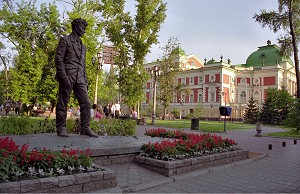 |
|
International Recognition:
In the middle of XIX century, Irkutsk became one of Siberia's research centers. In 1831, thanks to assistance
of Governor-general Muravyov-Amurskiy, Siberian branch of Russian geographical society was opened in the city.
In 1949, East Siberian branch of USSR Academy of Science was founded in Irkutsk. In the course of time, it
turned into a powerful academic complex, which is second largest in terms of both size and significance in
Siberian branch. It consolidates research and development, auxiliary research, production and commercial
organizations of the Siberian Branch of Russian Academy of Science, which are located both in Irkutsk region
and, partly, in other regions of Siberia. Irkutsk research center |
includes 9 academic institutes employing over
one thousand five hundred research specialists, 12 academicians and correspondent members, over 200 doctors of
science and about 700 candidates of science.
Scientists of Irkutsk are making a valuable contribution into development of Russian and world science, into
formation of Siberia's social and economic potential, as well as resolution of large scale environmental
problems of the region, including, among others, preserving unique ecosystem of lake Baikal. Unique
developments of Irkutsk researchers are widely known both in Russia and abroad. These developments pertain
to problems of Earth structure and development of continental rift zones similar to lake Baikal, which allow
to determine their main development patterns using Eurasia, East Africa and North America as development
samples. Systemic studies in this area were used as the basis for a method allowing to identify seismic hazards
in various regions of Russia and other countries of northern Eurasia. Irkutsk research center maintains
international relationships with over 100 research institutions and organizations from 30 countries by
participating in joint programs and bilateral agreements. Academic science of Irkutsk gained well earned
international recognition, which may be substantiated, in particular, by ever growing number of rated research
publications, expansion of international scientific and technical contacts. The development history of the
research center will forever list the names of scientists, who made large contributions into development of
science in Siberia. These include academicians well known both in Russia and abroad: V. V. Vorobyov, G. I. Galaziy,
N. A. Logachyov, V. M. Matrosov, L. A. Melentiev, Yu. N. Rudenko, V. B. Sochava, L. V. Tauson; correspondent
members of RAS: V. V. Zvonkov, M. M. Odintsov, E. V. Pinneker, L. S. Popyrin, F. E. Reymers, V. P. Solonenko,
V. E. Stepanov, N. A. Florensov, M. Shostakovskiy. 6 RAS academicians are currently working in the institutes
of the Center to maintain development of scientific potential of our region: M. G. Voronkov, M. A. Grachyov,
G. A. Zherebtsov, M. I. Kuzmin, F. A. Letnikov, A. P. Merenkov, B. A. Trofimov, and 6 correspondent members
of RAS: S. N. Vasilyev, N. I. Voropay, V. M. Grigoryev, R. K. Salyaev, E. V. Sklyarov, V. A. Snytko.
Irkutsk Health
Irkutsk is one of the largest health care centers of Siberia and the Far East, which provides qualified health
care to residents of Irkutsk, its region and neighboring regions through over 70 medical institutions.
The history of medicine development in Irkutsk — both research and practical — is inseparably linked to the
history of the city: from hospitals instituted by Order on public care (1818) up to modem medical centers of
regional and all-Russia scale.
The following modern municipal medical facilities are located in the city: Clinical hospital #1, which provides
virtually all kinds of urgent medical aid to population; City's clinical hospital #3, the only hospital in the
city, which provides urgent medical aid for injuries and burns; City's Ivano-Matryoninskaya children's clinical
hospital, City's clinical hospital #8, which is the city's largest hospital and polyclinic complex.
Over many years now, a number of unique medical institutions have been successfully operating in the city:
Diagnostic center, MNTK "Eye microsurgery", Oncological center for Siberian Federal district, Dikul's Center
and others, which provides the highest professional level of medical services to residents of Irkutsk and its
region.
A significant portion of the city's medical institutions have over one hundred years of age.
Irkutsk city is famous for its dynasties of doctors, which made a meaningful contribution into development of
Russian medicine. The names of their founders and their descendants are well known not only in Russia, but also
abroad.
One of the most famous of these was Khodos Khaimber Gershonovich, doctor of medical science, professor, founder
of Irkutsk neurological school, author of numerous research publications and a textbook for medical students.
Shanturov Anatoliy Grigorievich, the continuer of Shanturov's doctor dynasty, doctor of medical science,
professor, honored researcher of RF, full-fledged member of International Academy of otolaryngology.
Serkina Alexandra Vasilievna, the founder of a doctor dynasty, professor, founder of Siberia's first center of
vessel surgery, which still exists and is actively developing on the basis of Clinical hospital #1 of Irkutsk.
Medicine of Irkutsk city, with its powerful scientific and practical potential holds a well-earned place in the
country.
One of the city's oldest medical institutions — Ivano-Matryonenskaya children's clinical hospital is the
headquarters of newborn surgery center, which has high-class children surgeons recognized both in Russia and
overseas. These include Kozlov Audrey Yurievich, who is the center's leader at the moment, Novozhilov Vladimir
Alexandrovich, doctor of medical science, professor, now the hospital's physician-in-chief. In addition to
numerous other titles and awards, he won all-Russia's contest «Best doctor of the year».
Traumatologists of City's clinical hospital N3 won several prizes of the Governor of Irkutsk region in science
and techniques, a doctor form City's clinical hospital N10 became winner of all-Russia's contest «Best doctor of
the year» in «neurologist doctor» nomination.
Municipal health care system employs over 100 medics with honored title of «Honored doctor of RF» and «Health
care champion». The city's doctors take active participation in international medical symposiums in Germany,
Sweden, Spain, the USA and other countries.
The city of Irkutsk has over 30 municipal medical institutions, which are at the same time basis for departments
of Irkutsk state medical university, Irkutsk state institute of doctors' further training, and other institutions
of higher education and research. The city hosts Siberian branch of East Siberian scientific center of Russian
Academy of medical science.
Sport in Irkutsk city
Located right in the heart of Siberia, Irkutsk was always famed for its bright and rich sports life, while its
people are known for their passion for sports and competitions. Its stadiums, large and small courts and race
tracks have always been and still are training grounds for young men and women, best sportsmen of the city,
region and other regions of Russia.
People of Irkutsk are proud of their achievements in sports, of their sports heroes, Olympic champions, winners
of world, Europe and Russia's championships. Local Irkutsk Olympics «Irkutsk — a sports city» are held on a
regular basis involving participation of pre-school educational institutions, schoolchildren, students of
technical and vocational schools, students of higher education, companies personnel, sports vets and pensioners.
In 2007—2008 academic year, over fourteen thousand persons took part in the local Olympics.
Fifty-one sport courts are located in the city's residential areas. In summer, these courts are used, under
trainers' supervision, for volleyball, soccer, basketball, ping-pong and other games, while in winter these
courts are used as ice courts for ice hockey with ball. In 2007, these courts offered their services to over
ten thousand children.
Total of over sixty thousand persons are engaged into physical culture and sports in the city.
Ice-hockey with ball has the greatest popularity among people of Irkutsk. There are never any spare seats at
local team's «Baikal-Energia» matches. This team plays sustainably in Russia's championship never leaving the
top five list of teams. Younger sportsmen, who will soon replace masters, are now demonstrating as much
stability. In 2008 year junior sportsmen team won Russia's championship in Kazan city, while the team's coach
Vladimir Naumov was recognized as Russia's best junior coach for second year in a row.
Major international competitions in many sports are held in Irkutsk. International tournament in free
calisthenics in memory of seven-time world champion Oxana Kostina stirs greatest attention in Irkutsk. In 2008
year this tournament will be held for the second time as a world cup stage and a final rehearsal before the
Olympics in Beijing. The tournament will see performance of the new star of Irkutsk free calisthenics Darya
Dmitrieva, who recently became Europe's junior champion in Torino, Italy. Also, of great interest to people in
Irkutsk are international competitions in Greek-Roman wrestling for the prize of K. G. Vyrupaev — an Olympic
champion and an honored citizen of Irkutsk, as well as international competition in track-and-field "Memorial
of Irkutsk track-and-field sportsmen".
Irkutsk sportsmen gained greatest success in the following sports: aerobics representatives became champions of
the world, Europe and Russia in team and individual sets (Anna Streltsova — world and Europe's champion), range
shooting (Sokolov brothers — champions of Europe and world cup winners), personal combat (sportsmen trained by
Igor Starukhin became world and Europe's champions), track-and-field (Elena Zadorozhnaya — fourth place in
Athens Olympics, Elena Bolsun — winner of world student games in Seoul, Anton Luboslavskiy — junior champion of
Europe.
Annually, over three hundred mass sports events are held in Irkutsk. Thousands of participants and fans are
attended by some of the traditional sports events: «Skier's day», «The cross of nations», relay race for
«Vostochno-Sibirskaya pravda» prize, combats fest and other sports events.
|
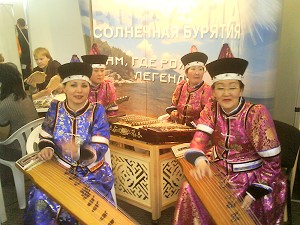 |
|
Cultural traditions of Irkutsk:
Irkutsk is the city of vivid cultural traditions. It has been the home for birth and development of Siberian
school of painting. The first provincial picture gallery was opened here, and the first novel was written here.
Works of Irkutsk writers are widely known not only in RUssia, but also far abroad.
Irkutsk hosts 114 culture and art institutions and their branches of various ownership forms, including 56
municipal institutions. The city has four state-sponsored theatres, a philharmonic society, an organ hall, four
state museums, three regional libraries. Seven municipal cultural institutions include the following: folk drama
theatre, 14 children schools of esthetic education, 32 libraries of centralized library system, Humanitarian
center-library after Polevykh family, museum of Irkutsk history with two branches, children's theatrical center |
"Lubimovka". Leadership of popularity among Irkutsk art groups may be awarded to municipal children's
choreographic group "Solnyshko". This ensemble has been working since 1990, and it has won numerous prizes in
all city and regional contests, many Russian and international festivals.
The city is famous for its school of fine arts, theatrical school. Two literary organizations are located in
Irkutsk. Irkutsk is the motherland for writers of the world scale - Valentin Rasputin and Alexander Vampilov,
stage director Leonid Gaidai, actor Nikolay Okhlopkov, pianist Denis Matsuev.
Each year since 1995, Irkutsk hosts all-Russia's festival - Days of Spirituality and Culture "The Glory of
Russia", which is attended by the best groups of the country. The day of the city is one of the most loved
holidays for the people of Irkutsk, which is celebrated in the beginning of June. Festival of children's art
"Spring drippings" has been held in Irkutsk for 10 years straight attended by young dancers, singers, artists,
actors, photographers, poets and bards. Festival "Stars at Baikal" and traditional "Decembrists soirees" are
very popular among both people of Irkutsk and visitors of our city.
For a long time, Irkutsk was home for people of different nationalities and religions. Currently, people of over
120 nationalities are living in Irkutsk. Over the years, public organizations based on national belonging
appeared in Irkutsk. Far away from their homeland, people sought to preserve and to develop their national
cultures and many centuries of traditions. That is why most national and cultural autonomies and organizations
of Irkutsk are engaged to restore their national identity, to preserve their uniqueness, traditions and
historical-cultural heritage of their people. They cooperate to promote for development of their national
languages, literature and art. Many nationality-based organizations of Irkutsk have over 10 years of history.
A synagogue, a mosque, catholic Cathedral of Madonna's Immaculate Heart are located in Irkutsk.
Irkutsk Honor & Glory
If you look at personalities in the history of Irkutsk, you will see a whole gallery of bright, extraordinary
people, who are just like their homeland. This is the motherland of Disciple of America and Siberia sanctifier
Innokentiy, playwright Alexander Vampilov, writer Valentin Rasputin, journalist and writer Nikolay Polevoy,
archaeologist Alexey Okladnikov, rocket designer Mikhail Yangel, founders of Russian helicopter construction
Nikolay Kamov and Leonid Mil. Irkutsk is closely linked to the lives of: discoverer of lands Erofey Khabarov,
sea navigator Vitus Bering, admirals Gennadiy Nevelskiy and Alexander Kolchak, writer Yaroslav Gashek, general
Dmitriy Karbyshev, creator of Soviet long-distance aviation Alexander Golovanov, astronaut Boris Volynov.
Irkutsk is famous for its merchants - benefactors and patrons of art: Trapeznikov, Sibiryakov, Bazanov, Khaminov,
Sukachyov, Butin, Medvednikovs.
Their biographies are the history and glory of our city. |
|
|